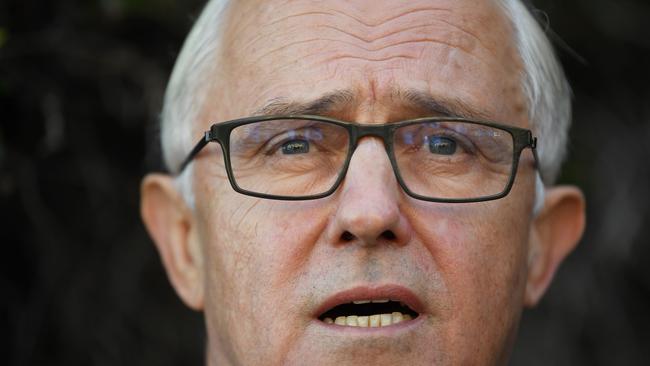Menzies had a word for Turnbull – it wasn’t ‘liberal’

Did you know Liberal Party founder Robert Menzies was a left-wing progressive?
Former prime minister Malcolm Turnbull thinks so. He says the Liberals were never a conservative party and that Menzies had purposely rejected traditional conservative politics because, at the time, “the authoritarian Right had no appeal”. That is true. Menzies abhorred all tyranny. He was, at heart, a classical liberal, not a “Big Brother knows best” Liberal.
Yet, if Menzies could be redefined as someone who fits right into today’s Liberal Party, that would delegitimise those who political “progressives” have dubbed as on the extreme Right.
Peter van Onselen thinks such a reincarnation is possible (“Broad church teeters on a narrow reactionary base”, December 1-2). He sees Menzies as certainly not “calling for the Liberal Party to be rooted in a conservative world view opposed to progressive thinking, nor a reactive populism that went against traditional liberal values”. Van Onselen concedes “he appears conservative today”, but reassures readers that “for the times in the 1940s, 50s and 60s he could hardly be characterised as overtly conservative”.
Lest there be any doubt about Menzies’ philosophy, it is clearly expressed in a 1974 letter lamenting that the “State executive is dominated by what we now call Liberals with a small l — that is to say who believe in nothing, but who believe in anything if they think it is worth a few votes. The whole thing is tragic.”
Not for him the fashionable Left. He was a nationalist, not a globalist. He was a monarchist, not a republican. While portrayed as an establishment figure, he believed the home, not the state, was “the foundation of sanity and sobriety”.
As prime minister he began dismantling the White Australia policy and he would be dismayed at the way multicultural immigration has been exploited for political gain. Left to him, free speech would now be an inalienable right and not left to the politics of Orwellian government agencies.
And you won’t hear anyone from the “progressive” political classes saying: “I do not believe that the real life of this nation is to be found either in great luxury hotels and the petty gossip of so-called fashionable suburbs, or in the officialdom of the organised masses. It is to be found in the homes of people who are nameless and unadvertised, and who, whatever their individual religious conviction or dogma, see in their children their greatest contribution to the immortality of their race.”
Menzies’ great fears for “the forgotten people” have been realised. The middle class he so earnestly championed, “those people who are constantly in danger of being ground between the upper and the nether millstones of the false war”, have, as he feared, been marginalised. New figures on the distribution of household income, spending and wealth, released by the Australian Bureau of Statistics, show the middle class is being hollowed out. Government intervention at multiple levels and the rise of crony capitalists are seriously impeding class mobility. Indeed, for at least the past eight years the middle class has visibly shrunk.
And it’s not only his fears for the middle class that have been validated. His despair with the way small-l liberals were taking over the party also has been confirmed. His description of those “who believe in anything if they think it is worth a few votes” aptly describes voters’ perception of today’s Liberal Party.
Turnbull’s capacity to “walk both sides of the street” in a leftward direction caused many traditional Liberals to become so disillusioned they resigned party membership, refrained from staffing booths at election time and withheld financial support.
Neither Turnbull nor his supporters see the irony in his personal bitterness towards the party that so naively and generously indulged him for so long. Brendan Nelson and Tony Abbott, the two leaders he treacherously removed, behaved impeccably by comparison. No doubt Turnbull, along with the party’s Svengali, Michael Photios, laments that the “progressive” reorientation of this once right-of-centre major party is incomplete.
They have assisted the successful preselection of an increasing number of small-l liberals through alleged branch stacking and influence peddling. But, without Turnbull as prime minister, that task is more difficult. Outside the parliamentary party, Turnbull’s influence is diminished.
This has apparently dawned on him. His barely disguised support for left-wing independent Kerryn Phelps in the Wentworth by-election and his alleged coaching of Julia Banks before her resignation from the party were executed under flimsy cover.
Now he has fully revealed himself by expressing total opposition to the Prime Minister’s intervention in the preselection of conservative Craig Kelly and possibly senator Jim Molan.
In so doing, he validates the suspicion his critics have long held that his belief in the Liberal Party’s concept of a “broad church” was simply artful.
While the media portrays this post-prime ministerial undermining of the election prospects of former colleagues who gave him the most prestigious job in the land as mere petulance and bitterness, his mocking of Scott Morrison could be more strategic.
A Liberal defeat at the next election and the possible defeat of arch-enemies Peter Dutton and Tony Abbott would be enormous personal and professional victories for Turnbull. If he could also head off the preselection of Kelly and damage Molan, he will have decimated the right-of-centre faction. In Turnbull’s mind, perhaps his recall is possible.
The Liberal Party faces an existential threat, not from outside but from within.
It remains to be seen after the next election how it will handle this, particularly as many conservatives are in the most marginal seats. Who knows, it could be the second time that Menzies forms a party out of the ashes of another.


